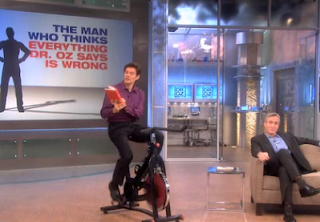 |
| Video 1: Gary Taubes on Dr. Oz' show talking about the futility of exercise. (Dr. Oz, official homepage) |
Relative to the DIO controls, both CR and EX reduced adiposity by 35–40% and serum leptin levels by 80%, but only CR increased adiponectin and insulin sensitivity.Meaning visible improvements in terms of body fat were almost identical (cf. fig. 1), while favorable metabolic changes in the areas of the hunger / satiety, insulin and leptin regulating peptide, as well as insulin sensitivity on the receptor level, occurred only in consequence to a reduction in caloric intake beyond maintenance.
 |
| Figure 1: Body weight and composition changes after 6 weeks on different diet / exercise protocols. (data adapted from Karrie. 2011) |
Gene expression microarray analysis of visceral white adipose tissue revealed 209 genes responsive to both CR and EX, relative to the DIO group. However, CR uniquely altered expression of an additional 496 genes, whereas only 20 were uniquely affected by EX. Of the genes distinctly responsive to CR, 17 related to carbohydrate metabolism and glucose transport, including glucose transporter (GLUT) 4.What this means is that both exercise, as well as calorie reduction, have 209 gene responses in common (probably responsible for the similar effects on weight loss); yet, additional 496 genes are modulated exclusively by calorie restriction and among these are 17, of which we already know that they are related to carbohydrate metabolism and glucose transport. It is thus suggesting itself to speculate that these genes are the ones, responsible for the beneficial effects on insulin sensitivity, which could not be observed in the exercise only group.
So, was Gary Taubes right, afterall? No. While it may be that exercise alone is not capable to upregulate insulin sensitivity its benefits on overall health, weight loss and above all weight maintenance have been so well established that it would be outrageous to question the advice any sensible nutritional counselor will provide his overweight clients with: Eat healthy (high protein, low / moderate carb, enough fat, whole foods, etc.), and moderately reduce your calorie intake, and begin an exercise regimen that is demanding, but not overcharging. Eventually, when this program has become a habit and the habit becomes a lifestyle, you can be certain that you are never going to be "the biggest loser" again.
